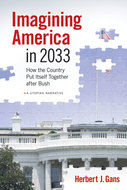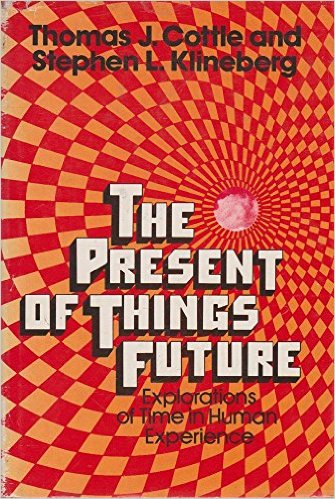I am not a futurist, but I have long been involved in social policy analysis, which is by definition oriented toward the future. Perhaps that helps to explain that I have also written about the future, beginning in 1956 when I was still a graduate student, and more recently in book-length in a utopia entitled Imagining America in 2033.1 Ann Arbor: University of Michigan PressMore info →
Ann Arbor: University of Michigan PressMore info →
The present paper stemmed from my work about the possibility that many problems of the contemporary economy and polity may continue into the future. Consequently, understanding how the citizenry and the country’s power holders now construct that future might help to shape it.
Although the research proposed here is limited to my own discipline, similar kinds of studies can, and should, be undertaken by the other social sciences.
American sociologists have, so far, not been very interested in studying the future. Perhaps they have been too firmly lodged in the present, and have been reluctant to engage in prediction. However, today, the United States is facing some major problems that could worsen in the years to come, and consequently the discipline ought to consider initiating an empirical study of the future.
“As an object of study and speculation, the future has not been entirely ignored.”As an object of study and speculation, the future has not been entirely ignored. Futurism and futurist thought have been around a long time, but they have been, and still are, devoted largely to predicting technological and other possibilities of the future.2 American futurism is centered around the World Future Society and its magazine, the Futurist.
More info → Sociologists have written about the future since the beginning of the discipline, but without considering it as a field of study. The first American empirical sociologists did so as well; for example, Robert Park proposed the eventual amalgamation of immigrants into the American mainstream as early as 1914.3See for example
→ Park, R. Racial Assimilation in Secondary Groups With Particular Reference to the Negro. American Journal of Sociology, 19(5) (1914): 606-623.
→ Gans, Herbert J. “American Jewry: Present and Future (Part I).”Commentary 21 (1956): 422.
Contemporary sociologists began to look into what lay ahead for society about a half century ago; notably the work of Wendell Bell,4 The 1972 meeting of the American Sociological Association included a session on the sociology of the future and the Russell Sage Foundation published a book entitled The Sociology of the Future that same year.
More info → Thomas Cottle, Stephen Klineberg,5 New York: Free Press, 1974.More info → and a handful of others who invented or reinvented the sociology of the future in the early 1970s. Their expectations were broad, including not only imagined futures, but also utopias. However, their work did not seem to stimulate other sociological work, and the discipline’s interest in the subject all but disappeared.
New York: Free Press, 1974.More info → and a handful of others who invented or reinvented the sociology of the future in the early 1970s. Their expectations were broad, including not only imagined futures, but also utopias. However, their work did not seem to stimulate other sociological work, and the discipline’s interest in the subject all but disappeared.
Since then, a handful of individual sociologists from a variety of fields have written about a sociology of the future, including Wendell Bell, Ann Mische, Cynthia Selin, and Art Shostak.6 → Bell, Wendell. Foundations of Futures Studies: Human Science for a New Era: Values, Objectivity, and the Good Society. Transaction Publishers, 1973.
→ Mische, Ann. “Projects and possibilities: Researching futures in action.” Sociological Forum, vol. 24, no. 3, pp. 694-704. Blackwell Publishing Ltd, 2009.
→ Selin, Cynthia. “The Sociology of the Future: Tracing Stories of Technology and Time.” Sociology Compass 2, no. 6 (2008): 1878-1895.
→ Shostak, Arthur B., ed. Utopian Thinking in Sociology: Creating the Good Society: Syllabi and Other Instructional Materials. American Sociological Association, 2001. Even so, no collective effort to resume the work of the early 1970s has thus far developed.
The role of the future today
However, now the United States’ future is perceived as filled with more problems than in the past. These include global problems that also affect the United States, such as climate change and its associated natural and human-made disasters, which can quickly become widespread in an ever more interdependent world. In addition, the country has been hit by seemingly ever rising inequality—foremost economic and political—while its economy has suffered from regular economic slowdowns and labor market stagnation.
Partly as a result, the two major political parties have moved further apart, resulting in political polarization, governmental paralysis, and the escalation of long-quiescent class and race struggles. Pollsters asking people whether or not the country is moving in the right direction are increasingly obtaining negative answers.
These and other problems further stimulate concern about the country’s future. References to the future increasingly surface in the national conversation, not only about the economy and the polity, but about many of the country’s most important private and public organizations and institutions.
“Current conditions necessitate and are favorable for reviving the study of the future.”Consequently, current conditions necessitate and are favorable for reviving the study of the future. This study should eschew predicting likely or possible futures. Instead, it should become empirical; discovering whether and how individuals, organizations, institutions, and other groups or social bodies now construct the future, and whether and how these constructions are affecting current actions, ideologies, and social structures.
The proposed study of the future should include policy-oriented research, looking at how the various future constructions can encourage more effective and democratic policymaking in the present and stimulate interest in long-range planning. Sociologists interested in policy analysis and policymaking could then frame research that would suggest and test the programs and politics to bring about improved policymaking.
The social construction of multiple and diverse futures
I assume that, for sociologists at least, the future is an imaginary, that can only be socially constructed. Construction must be defined broadly to include imagined, wished for, and expected futures—but also utopian and dystopian ones. In the following, I will note a few more parameters and caveats for such a study of the future.
“The future is an imaginary, that can only be socially constructed.”Above all, however, the research, and thus the definition, must focus on the future constructions that individuals and social bodies are likely to or might act on in the present, or at least take into account. The remainder of the paper will suggest some research questions for individuals and a variety of social bodies.
Individuals should be asked whether they have ever thought seriously about their and the country’s future, and if so, to describe both futures in as much detail as possible. Although many people may not think more than a short time ahead, individuals should be quizzed about longer-range futures, letting them decide the timeframe. If necessary, people could be probed about the futures of their children and grandchildren, including prospective ones. That question may turn out to be the best way of discovering popular future constructions, at least among parents.
Indeed, most people will respond best about their own and their familial futures, but they must also be encouraged to talk about community and national futures.
The sociology of the future ought also to study individuals who are reluctant and opposed to constructing the future, including those that think they have no future. Even the ones who locate their constructed future in the afterlife have to be studied. More broadly, those who have not thought seriously about the future should be able to report that they have not done so, but they should be asked about their reasons for not doing so. For those who have thought about the future, further probing should determine whether their future constructions are positive/optimistic or negative/pessimistic or hopeful/fearful, which individuals and social bodies are mentioned in their images, and what if anything they have done now that could affect their or the country’s future. Everyone should also be asked about the most widely discussed likely future possibilities, such as further technological innovations, as well as future social problems.
Sufficient demographic information must be collected to determine differences in future constructions by age, gender, income, education, social class, religion and religiosity, race, political ideology, and interests.
Demographic data should enable researchers into differences in future construction based on income and education. Is it the case that most future construction, as well as future-oriented activities, is undertaken by the better-educated and more affluent parts of the population? Might one hypothesize that they are usually the people least anxious about their own future. Conversely, is it the case that people who live from paycheck to paycheck (or worse) have to think about urgent and immediate matters and so lack incentives for thinking about the future? Do they even avoid doing so, or to limit themselves to their fears about the future?
Individuals must be asked whether they have participated in group constructions of the future, with their families or in informal groups and networks with which they are in regular contact, as well as about community, national, and societal futures.
Beyond individuals, the sociology of the future must pay special attention to future constructions by both informal and formal organizations and institutions—both public and private. Controversies and negotiations over the future within and between these social bodies are relevant as well, as is the future of community, national, and international politics. Formal organizations comprise a large category that includes not only businesses and other firms, but all organizations that hire staff and depend for their incomes on customers, clients, patients, members, donors, and others. They include multinational corporations and small firms but also hospitals, foundations, universities, and churches—in fact, the entire array of the country’s institutions. These organizations are similar insofar as they must continue their present activities and fulfill their mandates, as well as carry out their obligations to their current sources of income and workers while they engage in future construction and long-range planning.
The array of formal organizations could be divided among those primarily oriented toward the present, such as most fossil fuel producers, those that devote much of their attention to possible futures, such as start ups in Silicon Valley elsewhere. All of them must be asked about their future constructions and the relation of these to, and conflicts with, present-oriented activities. The ways in which they reconcile the present- and future-oriented activities of their organizations are relevant too. For example, we already know that tobacco and fossil fuel industry researchers knew about the future ill effects of their products even as their public relations and advertising departments and lobbyists denied the existence of such effects. How other organizations manage such contradictions and how these affect their future constructions need to be studied.
Those organizations that depend on the government for future resources, or that are subject to government regulation have to be asked about their relations to the relevant government agencies. The same question needs to be explored with groups dependent on private organizations.
Some parts of federal, state, and local governments may have to or may seek to consider and plan for the future. While they resemble other formal organizations in that respect, they must also answer to whoever supplies and makes demands on their power (i.e., politicians, political donors, lobbies, pressure groups, activists, and constituents). Elected officials as well as the appointed ones with whom they work must necessarily be present-oriented. Consequently, it will be particularly important to ask how they deal with future-oriented issues.
An empirical sociology of the future should also devote some research to future workers: organizations, professions, and individuals who construct futures for the society at large and various sectors.
They include demographers engaged in population and other projections, futurists, forecasters and prophets, and financial experts who construct futures for Wall Street and the business community. Venture capitalists and long-range economic and social planners are also future workers. So are the inventors and other innovators they finance.
Yet others on the future worker list are social movements as well as the individuals and groups charged with future constructions by ideological organizations. Religious individuals and organizations believing or advocating for the Messiah, end times, and other constructions of religious futures must be included. Secular ideologues in and out of politics belong on this list as well, even revolutionaries who are thinking about what should happen once the revolution has been achieved. At the same time, conservatives and their future constructions should receive special attention. They may be most intensely concerned with preserving the past, but in so far as they want it to continue into the future.
Other future workers are artists and architects, particularly those who describe their works as futuristic. Among writers and filmmakers, those producing dystopian and utopian fiction are of particular interest. Right now, they produce a great deal of the former and little of the latter, and whether and how that affects the future constructions of their audiences deserves study as well.
Research should be devoted also to the origins of future constructions, including personal and impersonal sources. Macrosocial sources, notably external forces, must be included, for they may be significant causal influences on whether and what futures are constructed.
This project can be approached empirically by asking future workers and their organizations about the incentives for constructing futures, as well as the direct and indirect external and internal pressures on them for doing so.
The promise of future research
The empirical study of the future will be an ongoing enterprise. Today’s future constructions will either change naturally over time or as a direct result of unexpected happenings or changing conditions in the country and its major organizations and institutions. If the pace of climate change, the current stagnation of the economy, the polarization of the polity, and the rise in inequality and downward mobility continue, then popular, elite and expert concern about the future will likely intensify.
“The empirical study of the future will be an ongoing enterprise.”Since the emergence of new social, economic, and political issues can be guaranteed, their effects on individual and social futures will keep sociologists of the future busy. Consequently, a concerted and continuing empirical research program to understand how the US constructs the future could help policy makers and politicians anticipate some of the country’s future problems and propose long range policies and plans to avoid or minimize them. Knowledge about how diverse sectors of the population are thinking about the future would help national and local decisionmakers obtain some idea of what initiatives are politically, economically, socially and culturally feasible.
In any case, an empirical sociology of the future can look forward to a promising future of its own.
References:
More info →
→ Park, R. Racial Assimilation in Secondary Groups With Particular Reference to the Negro. American Journal of Sociology, 19(5) (1914): 606-623.
→ Gans, Herbert J. “American Jewry: Present and Future (Part I).”Commentary 21 (1956): 422.
More info →
→ Mische, Ann. “Projects and possibilities: Researching futures in action.” Sociological Forum, vol. 24, no. 3, pp. 694-704. Blackwell Publishing Ltd, 2009.
→ Selin, Cynthia. “The Sociology of the Future: Tracing Stories of Technology and Time.” Sociology Compass 2, no. 6 (2008): 1878-1895.
→ Shostak, Arthur B., ed. Utopian Thinking in Sociology: Creating the Good Society: Syllabi and Other Instructional Materials. American Sociological Association, 2001.














Pingback: For an Empirical Sociology of the Future – Technology Tube